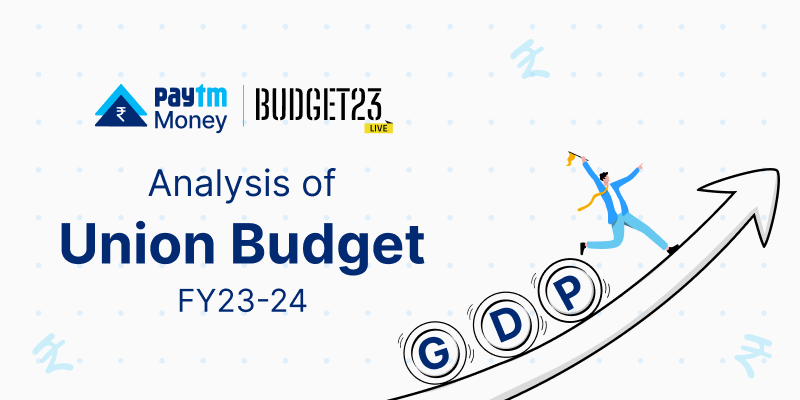Union Budget FY23-24 Analysis5 min read
On February 1, 2023, the long-awaited financial budget was finally presented to the parliament. Although many voices are already being heard from all over the nation analyzing the policies and estimates shared in the union budget for FY23–24, we at Paytm Money have done our best to present a logical perspective on each of the budget’s key issues and provide a thorough analysis of each one.
The finance minister, Nirmala Sitharaman, presented the annual budget for FY23-24 the first budget of “Amrit Kaal.” The budget brought joy and happiness to the salaried middle class as taxes were lowered under the new tax regime, which will be the default regime in FY23-24.
The government has decided to spend ₹10 lakh crore for FY23-24 as opposed to ₹7.5 lakh crore in FY22-23, so the capex allocation will be higher than anticipated. In this budget, funding for renewable energy has increased by 48%. In FY23, GDP growth is expected to be 7%.
The seven priorities that will lead India through the “Amrit Kaal” were highlighted and referred to as “Saptrishis” by FM in the union budget for FY23–24.
Seven priorities that will guide India are –
- Inclusive development
- Reaching the last mile
- Infrastructure and investment
- Unleashing the potential
- Green Growth
- Youth Power
- Financial sector
Let’s go into detail about the key components of the union budget for FY23–24:
1. Fiscal Deficit
- The fiscal deficit that is projected for FY23–24 is 5.9% of GDP, with a goal of achieving 4.5% by FY 2025–26.
- “Net market borrowings from dated securities are estimated at ₹11.8 trillion to finance the fiscal deficit in 2023–24,” the finance minister stated. Small savings and other sources are anticipated to provide the remaining financing. Estimated gross market borrowings are ₹15.4 trillion.
2. Income Tax
On the personal income tax front, individual taxpayers with a combined income of up to ₹7 lakh will not be required to pay any tax after utilizing the rebate available under both the old and new regimes. The current ceiling is ₹5 lakh under the new tax regime. The government has not made any changes to the old tax system.
- The new tax regime will be the default; the old regime will be available as an option.
- The new tax regime provides an annual tax exemption of up to ₹7 lakh.
- In the new tax regime, the highest surcharge was reduced from 37% to 25%, and the maximum tax rate is now 39%.
The Finance Minister has recommended capping capital gains deductions on residential real estate investments up to ₹10 crores under Sections 54 and 54F of the Income-tax Act. The government has also proposed to limit the income tax exemption from proceeds of high-value insurance policies. The long-term capital gains structure was left unchanged.
3. Infrastructure and Capital expenditure
For FY23–24, capital spending for infrastructure development will increase by 33% to ₹10 lakh crore, or 3.3% of the GDP, according to Finance Minister Nirmala Sitharaman.
- This budget keeps govt capex balanced and provides a much-needed push to the private sector
- Govt has allocated ₹ 30,000 crores for OMC capex in FY23-24
While the Ministry of Defence has received the biggest budget of any ministry, at ₹5.94 lakh crore, it is not a considerable increase over the ₹5.25 lakh crore obtained in the previous fiscal year.
4. Railways
The Indian Railways have received a significant boost, with the finance minister allocating ₹2.40 lakh crore for the fiscal year 2023-24, an increase of ₹1.03 lakh crore over the previous fiscal. The sum allocated for the railways is nine times greater than what was given in 2013–2014.
5. Tourism
On the other hand, much attention is placed on the tourism sector in order to increase employment possibilities and attract foreign tourists. Through the challenge mode, 50 tourist spots will be chosen and developed as a complete package for both domestic and foreign tourism.
- There will be efforts made to establish tourism in border villages.
- To promote the industry, the government will create a unity mall where state-wide important centres will be marked as tourist spots, monuments, and spaces for visitor
- To advance the “one district, one product” initiative, which will support state-made handicrafts and GI products.
6. Green economy
Recently launched, the National Green Hydrogen Mission has an outlay of ₹19,700 crore and will facilitate the transition of the Indian economy to low carbon intensity, reduce fossil fuel imports, and enable India to achieve technology and market leadership in this sunrise sector. The government has set a target to reach an annual production of 5 MMT by 2030.
7. Logistics
The government has identified 100 critical transport infrastructure projects to improve logistics. These projects will be undertaken on a public-private partnership basis, with an investment of approximately ₹75,000 crore, including approximately ₹15,000 crore from the private sector.
8. Start-ups
To encourage entrepreneurship, the budget proposes extending the date of incorporation for income tax benefits to new businesses from March 31, 2023, to March 31, 2024. Furthermore, it is proposed to extend the benefit of carrying forward losses on changes in shareholdings of start-ups from seven to ten years after incorporation.
While presenting the budget, Finance Minister Nirmala Sitharaman stated that this budget will serve as the foundation for the next 25 years i.e. India at 100. It was presented with optimism, and populism does not appear to be a priority before the election. The higher-than-expected capital expenditure allocation reflects a focus on growth while also promoting agriculture, employment, and green development.
Source: Publicly Available News & Union Budget FY23-24 Documents
Disclaimer: Investments in the securities market are subject to market risks, read all the related documents carefully before investing. This content is purely educational and for investor awareness purposes only, it is in no way to be considered as advice or recommendation. Paytm Money Ltd. SEBI Reg No Broking – INZ000240532. NSE (90165), BSE( 6707) , BSE STAR MF Member ID – 53873, SEBI Reg. No. INA100009859, PFRDA NPS ePOP Reg. No. 269042019 . Regd office: 136, 1st Floor, Devika Tower, Nehru Place, Delhi – 110019. For more details visit www.paytmmoney.com




